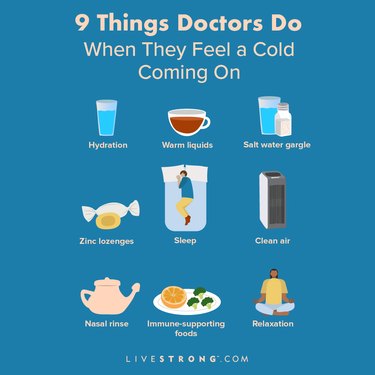
When the scratchy throat and body aches kick in, you just know a cold is coming on — and in the moment, it can feel like the only thing left to do is ride it out by letting your immune system do its thing.
But even if cold symptoms have already started, it's too late to do something about them.
Video of the Day
Video of the Day
"The early signs of a cold coming on are an advantage, allowing us to react before the virus takes us off our feet," Naueen Safdar, MD, medical director of EHE Health, tells LIVESTRONG.com. "Generally, it takes two to three days after the virus enters the body before a cold begins, so that gives us time to combat the virus before it worsens."
As for which cold-busting strategies to use, there are several that doctors personally swear by to limit the severity and duration of their symptoms.

1. 'Stay Hydrated'
"When I notice a cold coming on, I make sure to hydrate and maintain my electrolytes," says Ameet R. Kamat, MD, director of sinus and skull base surgery at White Plains Hospital in New York.
His hydration strategy involves drinking enough water (and sometimes electrolyte beverages) and avoiding dehydrating beverages, such as high doses of caffeine or alcohol.
"Water helps with oxygen delivery and removal of toxins from the body," Dr. Kamat says. "It also helps with lymphatic flow [the body's filtration system], which is essential to immune system function."
2. 'Drink Warm Liquids'
New York-based integrative physician Patrick Fratellone, MD drinks plenty of warm liquids — especially herbal teas — when he starts to notice cold symptoms.
Besides how soothing they can be when your throat is itchy and sore, warm liquids ensure the mucus produced by the body doesn't get too thick, making it easier to break up congestion as your body combats the virus.
"Some of the teas I use are stinging nettle leaf, echinacea, goldenseal and elderberry for their antiviral properties and a teaspoon of raw honey for its antioxidant and antimicrobial properties," Dr. Fratellone says.
3. 'Gargle Away'
Another go-to for Dr. Fratellone is gargling with salt water, "which can help reduce the pain of a sore throat." Mix up 1/4 to 1/2 teaspoon of table salt in 4 to 8 ounces of water and gargle to help relieve swelling and irritation. Spit out the solution once you're done.
4. 'Pop Zinc Lozenges'
Dr. Fratellone also has a zinc lozenge every 6 hours, a practice thought to help decrease cold severity and duration by blocking the replication of rhinovirus — the virus to blame for many colds — according to a May 2017 study in JRSM Open.
Zinc helps the immune system fight off bacteria and viruses, and the coating zinc lozenges leave on the tongue and throat might be what makes it harder for the rhinovirus to move in on your mucous membranes (though more research needs to be done to determine the exact dosage and form of zinc to take — and for how long — before it can be considered an official cold remedy, according to the National Institutes of Health).
5. 'Sleep More'
The night she feels a cold coming on, Georgia-based ER doctor Darria Long Gillespie, MD makes sure to get to bed an hour or two early.
"When you're sleep-deprived, it makes your immune system more vulnerable to infection," Gillespie says. She also keeps Aleve on hand should any body aches, pains or fever kick in and potentially affect the quality of her sleep.
Dr. Kamat is diligent about getting enough sleep, too: "The amount can vary among different people, but in general, I try to get at least seven to eight hours when I'm starting to feel sick," he says. "Improved sleep can improve the production of antibodies and function of T cells (which fight against viruses)."
It also decreases stress hormone production and pro-inflammatory molecules, he adds, which should allow for better immune function.
6. 'Rinse Your Sinuses'
When Dr. Kamat starts to feel nasal symptoms, he uses a nasal saline irrigation twice a day.
"This helps the small cells called cilia that are designed to promote mucus clearance," he says. "The rinse also helps decrease the viscosity of the mucus, allowing your body to clear it faster."
A nasal rinse is usually done with a specially designed 8-ounce bottle (typically a neti pot, bulb syringe or squeeze bottle), distilled water and saline packets, which essentially contain salt and baking soda. When used and cleaned properly, they can be quite effective, according to the Food & Drug Administration.
7. 'Take It Easy'
"I do extra to manage stress, such as time away from work, daily meditation and exercise (while maintaining good hydration)," Dr. Kamat says. "I try to exercise only moderately, as it typically helps symptoms of runny nose, nasal congestion and sore throat."
As long as your cold symptoms are above the neck, mild to moderate exercise can be helpful, according to the Mayo Clinic. Just make sure to reduce the length and intensity of your usual workouts and listen to your body for when it's time to call it quits (or skip exercise entirely).
8. 'Breathe Clean Air'
Kunjana Mavunda, MD, a board-certified pediatric pulmonologist at KIDZ Medical Services in Florida, uses an air purifier as a way to encourage both prevention of and relief from a cold.
"The quality of the air we breathe affects the health of the respiratory tract," she says. "Polluted air, whether it's outdoor air (smoke from fires, pollution from cars) or indoor air (diffusers, plug-ins) can damage the airway's protective lining."
This facilitates respiratory infections, she adds, because then a virus or bacteria can penetrate the airway more easily.
9. 'Eat Immune-Supporting Foods'
Dr. Kamat limits sugar and gets plenty of fiber and vitamin C when he feels a cold coming on.
"I eat plenty of citrus fruit (and sometimes add lemon to my water)," he says, along with kale, broccoli, red onions, sweet potatoes, butternut squash and legumes. "Many of these foods are known for their antioxidant effects."
Meanwhile, he boosts his intake of grains because they're rich in fibers called beta-glucans, which are linked to immune function, according to a September 2017 report in the International Journal of Molecular Sciences.
- Molecules: “Effect of Tea Catechins on Influenza Infection and the Common Cold with a Focus on Epidemiological/Clinical Studies”
- Pharmacology Research: “Honey and Health: A Review of Recent Clinical Research”
- National Institutes of Health: “Zinc”
- Mayo Clinic: “Zinc for colds: The final word?”
- Mayo Clinic: “Lack of sleep: Can it make you sick?”
- Food & Drug Administration: “Is Rinsing Your Sinuses With Neti Pots Safe?”
- Mayo Clinic: “Is it okay to exercise if I have a cold?”
- CDC: “General Physical Activities Defined by Level of Intensity”
- Kaiser Permanente: “Beta-Carotene”
- Cleveland Clinic: “Eat This, Not That to Fight Colds and Flu”
- National Center for Complementary and Integrative Health
- Molecular Nutrition & Food Research: “Beta-Glucans and Immunity: State of the Art and Future Directions”
- JRSM Open: "Zinc lozenges and the common cold: a meta-analysis comparing zinc acetate and zinc gluconate, and the role of zinc dosage"
- International Journal of Molecular Sciences: "Clinical and Physiological Perspectives of β-Glucans: The Past, Present, and Future"
Is this an emergency? If you are experiencing serious medical symptoms, please see the National Library of Medicine’s list of signs you need emergency medical attention or call 911.




